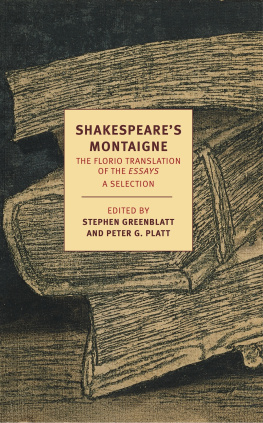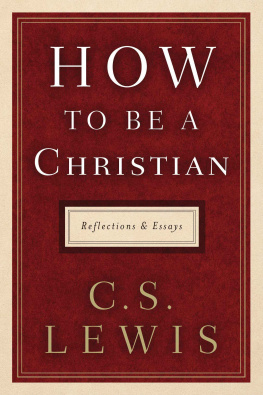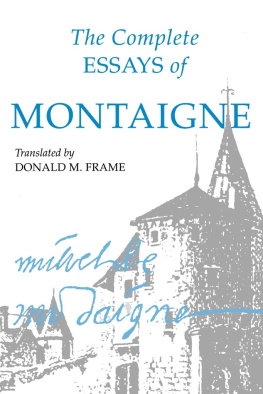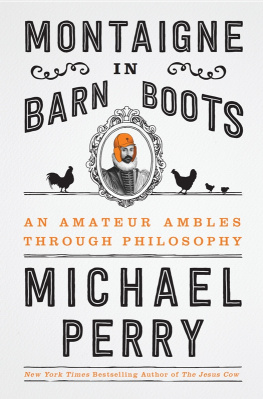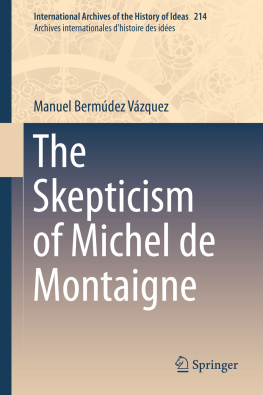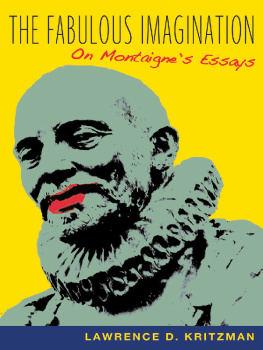
AN APOLOGY FOR RAYMOND SEBOND
MICHEL EYQUEM , Seigneur de Montaigne, was born in 1533, the son and heir of Pierre, Seigneur de Montaigne (two previous children dying soon after birth). He was brought up to speak Latin as his mother tongue and always retained a Latin turn of mind; though he knew Greek, he preferred to use translations. After studying law he eventually became counsellor to the Parlement of Bordeaux. He married in 1565. In 1569 he published his French version of the Natural Theology of Raymond Sebond; his Apology is only partly a defence of Sebond and sets sceptical limits to human reasoning about God, man and nature. He retired in 1571 to his lands at Montaigne, devoting himself to reading and reflection and to composing his Essays (first version, 1580). He loathed the fanaticism and cruelties of the religious wars of the period, but sided with Catholic orthodoxy and legitimate monarchy. He was twice elected Mayor of Bordeaux (1581 and 1583), a post he held for four years. He died at Montaigne (1952) while preparing the final, and richest, edition of his Essays.
M. A. SCREECH is an Extraordinary Fellow of Wolfson College and an Emeritus Fellow of All Souls College, Oxford, a Fellow of the British Academy and of the Royal Society of Literature, and a Fellow of University College, London. He long served on the committee of the Warburg Institute as the Fielden Professor of French Language and Literature in London, until his election to All Souls in 1984. He is a Renaissance scholar of international renown. He has edited and translated the complete Essays for Penguin Classics and, in a separate volume, Montaignes Sceptical Apology for Raymond Sebond. His other books include Erasmus: Ecstasy and the Praise of Folly (Penguin, 1988), Rabelais, Montaigne and Melancholy (Penguin, 1991), and, most recently, Laughter at the Foot of the Cross (Allen Lane, 1998); all are acknowledged to be classic studies in their fields. In Latin, he is the editor, with Anne Screech, of Erasmus Annotations on the New Testament (in three volumes). Michael Screech was promoted Chevalier dans la Lgion dHonneur in 1992. He was ordained, in Oxford, deacon in 1994 and priest in 1995.
MICHEL DE MONTAIGNE
AN APOLOGY FOR RAYMOND SEBOND

Translated and edited with an Introduction and Notes by M. A. Screech
PENGUIN BOOKS
PENGUIN BOOKS
Published by the Penguin Group
Penguin Books Ltd, 27 Wrights Lane, London W8 5TZ, England
Penguin Putnam Inc., 375 Hudson Street, New York, New York 10014, USA
Penguin Books Australia Ltd, Ringwood, Victoria, Australia
Penguin Books Canada Ltd, 10 Alcorn Avenue, Toronto, Ontario, Canada M4V 3B2
Penguin Books (NZ) Ltd, Private Bag 102902, NSMC, Auckland, New Zealand
Penguin Books Ltd, Registered Offices: Harmondsworth, Middlesex, England
Published in Penguin Books 1987
Reprinted with corrections 1993
Copyright M. A. Screech, 1987, 1993
All rights reserved
Except in the United States of America, this book is sold subject to the condition that it shall not, by way of trade or otherwise, be lent, re-sold, hired out, or otherwise circulated without the publishers prior consent in any form of binding or cover other than that in which it is published and without a similar condition including this condition being imposed on the subsequent purchaser
ISBN: 978-0-14-195940-5
FOR
the kindest of hosts:
the Jesuit Fathers of Regina
CONTENTS
INTRODUCTION

Montaigne enjoys a place apart among French Renaissance authors. Men and women of all sorts are fascinated by what they find in him. Many read him for his wisdom and humanity, for which he may be quoted in a newspaper as readily as in a history of philosophy. He writes about himself, but is no egocentric and is never a bore. He treats the deepest subjects in the least pompous of manners and in a style often marked by dry humour. His writings are vibrant with challenge; they are free from jargon and unnecessary technicalities. In the seventeenth century, Pascal, the great Jansenist author of the Penses (Thoughts which owe much to Montaigne), was converted partly by reading him and was soon discussing the Essays at Port-Royal with his director, LeMaistre de Sacy (who had his reservations). Pascal gained, it is said, thirty years by reading Montaigne, thirty years of study and reflection. Others, too, have felt the same. For Montaigne gives his readers the fruits of his own wide reading and of his own reflections upon it, all measured against his personal experience during a period of intellectual ferment and of religious and political disarray. Montaigne never let himself be limited by his office or station. As husband, father, counsellor, mayor, he kept a critical corner of himself to himself, from which he could judge in freedom and seek to be at peace with himself. He does not crush his reader under the authority of the great philosophers: he tries out their opinions and sees whether they work for him or for others. Traces of Plato, Aristotle, Plutarch, Cicero, St Augustine or of his own contemporaries can be found in every page he wrote, but they are skilfully interwoven into his own discourse, being renewed and humanized in the process. And he hardly ever names them.
An Apology for Raymond Sebond has all these qualities, despite its being the longest piece Montaigne ever wrote. In it, Montaigne remains triumphantly himself.
When his beloved father died (18 June 1568) he succeeded to the title and the estates at Montaigne, in South-West France. (Provisions were made for his mother.) He was thirty-five, and three years married. Soon he was able (1570) to sell his charge as counsellor in the Parlement of Bordeaux (a legal (His children all died young, too, except a daughter, Elonore, who was deeply loved but could not, for a nobleman, replace a son and heir.)
Montaignes project of calm study soon went wrong. He fell into an unbalanced melancholy; his spirit galloped off like a runaway horse; his mind, left fallow, produced weeds not grass. To shame himself, he tells us, he decided to write down his thoughts and his rhapsodies. That was the beginning of his Essays. But he was not a professional scholar: he had no subject to write about. He was not a statesman or a general. He soon decided to write about himself, the only subject he might know better than anyone else. This was a revolutionary decision, made easier, no doubt, by his bout of melancholy, for that humour encouraged an increased self-awareness. No one in Classical Antiquity had done anything like it. In the history of the known world only a handful of authors had ever broken the taboo against writing primarily about oneself, as an ordinary man. St Augustine had done so in the Confessions; during the Renaissance, Girolamo Cardano wrote On his Life and On his Books and Joachim du Bellay lamented his Roman exile in his poetic Regrets. But these works bear no resemblance to what the Essays were to become for Montaigne tentative attempts to assay the value of himself, his nature, his habits and of his own opinions and those of others a hunt for truth, personality and a knowledge of humanity through an exploration of his own reactions to his reading, his travels, his public and his private experience. The
Next page



